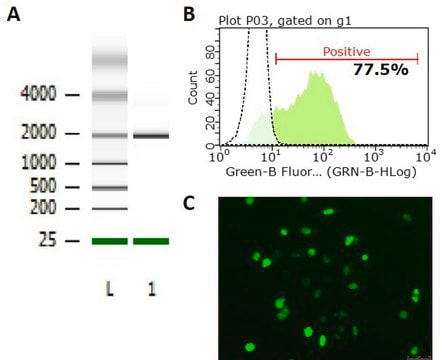CAS9MRNA
Cas9 mRNA
Synonyme(s) :
CRISPR Cas9 mRNA
Se connecterpour consulter vos tarifs contractuels et ceux de votre entreprise/organisme
About This Item
Code UNSPSC :
41106609
Nomenclature NACRES :
NA.51
Produits recommandés
Conditionnement
vial of 50 μL
Niveau de qualité
Concentration
500 ng/μL
Conditions d'expédition
dry ice
Température de stockage
−70°C
Catégories apparentées
Description générale
Cas9 mRNA generated through in-vitro transcription which has been capped and polyA-tailed. This mRNA should be used in conjunction with purified guideRNA. The use of RNA vs. plasmid constructs avoids complications with promoter-embryo compatibility as well as the possibility of random integration of nuclease and gRNA-expressing plasmids into the host animal genome.
Application
Functional Genomics/Transgenic Applications
- Creation of gene knockouts in transgenic applications
- Creation of knock-in animals with promoters, fusion tags or reporters integrated into endogenous genes
Caractéristiques et avantages
RNA ready to use in transgenic applications. Must be used in conjunction with a purified guideRNA sequence to mediate a site specific double strand break in the DNA.
Composants
1 vial containing 25ug of Cas9 mRNA.
Please note, product does not contain guideRNA sequence. This must be purchased separately through the Custom CRISPR product tab.
Please note, product does not contain guideRNA sequence. This must be purchased separately through the Custom CRISPR product tab.
Principe
CRISPR/Cas systems are employed by bacteria and archaea as a defense against invading viruses and plasmids. Recently, the type II CRISPR/Cas system from the bacterium Streptococcus pyogenes has been engineered to function in eukaryotic systems using two molecular components: a single Cas9 protein and a non-coding guide RNA (gRNA). The Cas9 endonuclease can be programmed with a single gRNA, directing a DNA double-strand break (DSB) at a desired genomic location. Similar to DSBs induced by zinc finger nucleases (ZFNs), the cell then activates endogenous DNA repair processes, either non-homologous end joining (NHEJ) or homology-directed repair (HDR), to heal the targeted DSB.
Forme physique
Sigma Cas9 mRNA is supplied at a concentration of 500 ng/ul (50 ul Cas9 mRNA, capped and polyA-tailed)
Notes préparatoires
While Sigma implements the same high quality RNA synthesis procedures that have been successful in many mRNA-based ZFN transgenic projects, we highly recommend centrifuging your final, concentration-adjusted CRISPR RNA samples immediately prior to microinjection to ensure all particulate material has been removed which may result in clogging of microinjection needles.
Autres remarques
Must be used in conjunction with the RNA format of a guideRNA sequence in order to mediate a double strand break in the DNA.
Typical microinjection concentrations used in the literature are in the ranges of 20-200 ng/ul for Cas9 mRNA and 10-50 ng/ul for gRNA.
While Sigma CRISPR RNA was not developed for robust application to cell culture, we have seen some success in detecting CEL-I activity using RNA-only formats for both CRISPR nucleases and paired nickases. RNA-only delivery formats may be favorable for cell types which are sensitive to double stranded DNA such a dendritic cells or when promoter-cell incompatibilities exist.
Informations légales
Produit(s) apparenté(s)
Code de la classe de stockage
12 - Non Combustible Liquids
Classe de danger pour l'eau (WGK)
WGK 1
Point d'éclair (°F)
Not applicable
Point d'éclair (°C)
Not applicable
Certificats d'analyse (COA)
Recherchez un Certificats d'analyse (COA) en saisissant le numéro de lot du produit. Les numéros de lot figurent sur l'étiquette du produit après les mots "Lot" ou "Batch".
Déjà en possession de ce produit ?
Retrouvez la documentation relative aux produits que vous avez récemment achetés dans la Bibliothèque de documents.
Les clients ont également consulté
Marc-Olivier Turgeon et al.
Endocrinology, 158(4), 815-830 (2017-03-23)
Loss-of-function mutations in the X-linked immunoglobulin superfamily, member 1 (IGSF1) gene cause central hypothyroidism. IGSF1 is a transmembrane glycoprotein of unknown function expressed in thyrotropin (TSH)-producing thyrotrope cells of the anterior pituitary gland. The protein is cotranslationally cleaved, with only
Notre équipe de scientifiques dispose d'une expérience dans tous les secteurs de la recherche, notamment en sciences de la vie, science des matériaux, synthèse chimique, chromatographie, analyse et dans de nombreux autres domaines..
Contacter notre Service technique















